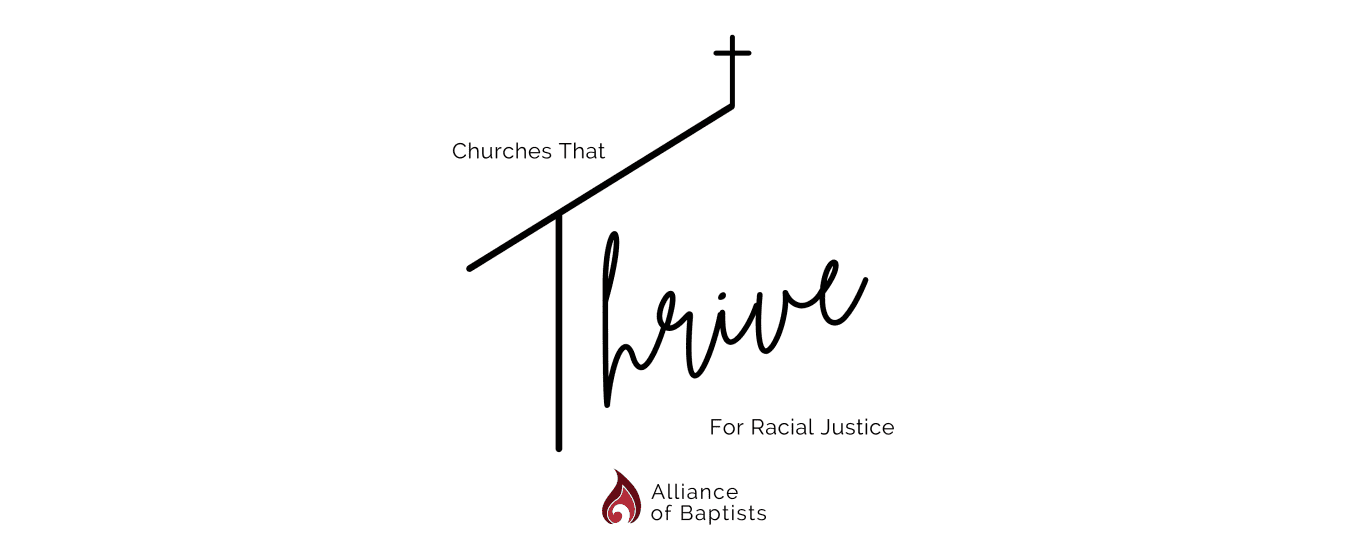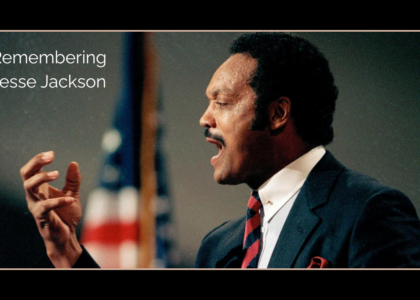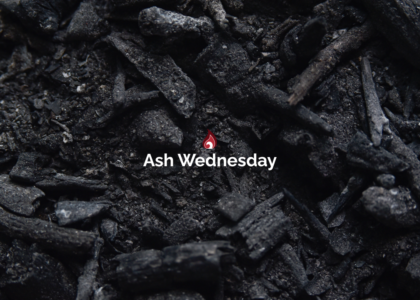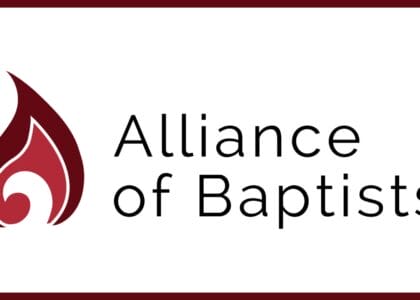By The THRIVE Leadership Team
We are truly grateful for our partnership with the Alliance of Baptists in fulfilling the work of the THRIVE Project. THRIVE builds on initiative established by the Alliance to address structures of whiteness in the churches toward becoming antiracist. Since the fall of 2020, 26 congregations entered a five year process of conversation and exploration, creating a learning community, leveraging established communication networks like the Annual Gathering of Alliance leaders and constituents, and new opportunities like our online Prophetic Imagination gatherings, to collaborate and share efforts that encompass the messages and ministries of racial justice.
The THRIVE Project grew out of many rich conversations between Rev. Dr. Benjamin Boswell, Senior Pastor of Myers Park Baptist Church in Charlotte, N.C., and Gerardo Martí, Professor of Sociology and Africana Studies at Davidson College. Together, they approached the Executive Committee of the Alliance with an idea to consider an ambitious grant from Lilly Endowment, Inc., that would focus on resourcing the already established direction of the Alliance focused on racial justice. The goal was to consider and observe racial justice efforts as currently happening in Alliance churches and to foster a community of learning where pastors, staff, and dedicated members would share their experiences. Further aided by collaboration from two other sociologists who also have dedicated careers focused on racial dynamics in American and Canadian congregations, Mark Mulder and Kevin Dougherty, a lengthy proposal was submitted, which successfully yielded a $1 million budget. The majority of this funding goes directly to support the racial justice efforts of the Alliance of Baptists.
Despite the significant challenges of the global COVID—19 pandemic, the relationships with THRIVE congregations has been superb. The current 26 congregations participating in the THRIVE Cohort are:
- Calvary Baptist Church, Denver, Colo. *
- Central Baptist Church, Lexington, Ky. *
- Circle of Faith, St. Petersburg, Fla. +
- College Park Baptist Church, Greensboro, N.C. +
- Emmanuel Baptist Church, Albany, N.Y. *
- First Austin, Austin, Texas *
- First Baptist Church, Columbia, Mo. +
- First Baptist Church, Edmonton, Alberta +
- First Baptist Church, Halifax, Nova Scotia +
- First Baptist Church, Madison, Wis. +
- First Baptist Church of Salt Lake City, Utah *
- First Baptist Church, Worcester, Mass +
- First Baptist Church of Christ, Macon, Ga. +
- Glendale Baptist Church, Nashville, Tenn.
- Highland Baptist Church, Louisville, Ky. *
- Judson Memorial Church, New York City +
- Lake Street Church of Evanston, Illinois +
- Myers Park Baptist Church, Charlotte, N.C. *
- Old Cambridge Baptist Church, Cambridge, Mass. *
- Peace Community Church, Oberlin, Ohio
- Pullen Memorial Baptist Church, Raleigh, N.C. *
- Ravensworth Baptist Church, Annandale, Va. *
- Royal Lane Baptist Church, Dallas, Texas *
- University Baptist Church, Hattiesburg, Miss. +
- University Baptist, Minneapolis, Minn. *
- Washington Plaza Baptist Church, Reston, Va. +
(Churches with an asterisk (*) had in-person visits by at least one of the sociologists on the team, both for immersive observation and for meetings with members of various racial justice committees and task forces from their ministries. Congregations with plus (+) are intended for visits in the near future. Our appreciation goes out to all the church leaders, staff, and pastors who dedicate their energies to accomplishing the work of antiracism.)
The earnest efforts and gracious actions by our THRIVE partners has been a joy to see. THRIVE churches in the United States and Canada engage in antiracist sermons, talks, workshops, and even whole conferences addressing whiteness. We observe church services, committee discussions, scheduled events, and informal interactions. We read reports of book clubs, listening sessions, and budget meetings. We meet with pastors, executive committee leaders, lay leaders, committees, project groups, and task forces. Leaders within the Alliance, which include persons of color, understand that merely mastering a rhetoric of racial justice is not adequate. They all urge action and strive to resource concrete conduct while celebrating encouraging activities. They not only attempt to address difficult structures of oppression in the world “out there” but also open themselves to considering how related dynamics might exist “right here” in their own congregations.
In addressing structures of racial exclusion, THRIVE ministries build on decades of attending to other issues of social justice, including the religious exclusion of women in ministry, the denial of inclusion, membership, ordination of LGBTQ+ persons, and sensitivity to the needs of persons with disabilities. This project therefore centers on how predominantly white churches have committed themselves to confronting the whiteness of their congregations. Buildings, funding, liturgy, and other aspects of congregational ministry all come into question. Among these pastors and church members, they experience a series of self-revelations of their own complicity in various systems of domination. Some are fighting their own religious past, while others simply recognize their own family backgrounds and the embodiment of their persons have accrued a variety of privileges which they are still becoming aware of. These experiences build toward a profound recognition of continued difficulty in working through racism, starting with an earnest attempt to “get it right.” In doing so, tensions and conflicts emerge, and managing those conflicts within their churches becomes part of the ministry of antiracism.
Currently, we are in the fourth year of a five year process–a year of “reflection.” Building on our conversations and relationships, we are pursuing more knowledge by sharing with our THRIVE church leaders what we are hearing and seeking feedback on our observations. We expect that the pace-setting learning from the Alliance will eventually be published as a rich resource for the work of racial justice among churches worldwide. We began the process of synthesizing our new knowledge in April 2024 with an afternoon meeting with THRIVE leaders during our in-person Alliance of Baptist annual gathering in Charlotte. Our shared discussions with THRIVE leaders will continue through 2024 and into Spring 2025, primarily through our online Prophetic Imagination gatherings (to be announced), as well as our ongoing in-person visits to congregations.
The Executive Board of the Alliance has fully adopted the THRIVE initiative and in many ways is moving beyond it. With gratitude for Paula Dempsey who helped launch the project, our more recent Alliance leaders, Malu Fairley-Collins and then Alexis Tardy, both working with Elijah Zehyoue, continue to coordinate our THRIVE Project Team meetings and are instrumental in the administration of the growing number of activities happening with and through the THRIVE learning community. We are pleased to report that the Alliance is making progress on fundraising to further secure these efforts for the future. Our thanks to Carole Collins and Lisa Dunson, in addition to members of the Board, leaders and members of our THRIVE churches, and the encouragement and insight received from so many others within the Alliance, all of whom have lent their support to these efforts. Together, let us all continue working toward the ultimate goal of promoting theologically-resourced empowerment, healing, and inclusivity–a more just world inspired by the Spirit who leads us all.
– The THRIVE leadership team includes: Rev. Elijah Zehyoue, Ph.D.; Rev. Alexis Tardy, D. Min.; Dr. Gerardo Marti; Dr. Kevin Dougherty; and Dr. Mark Mulder





Recent Comments